Key Social Policy and Economic Developments in Welfare State Report
VerifiedAdded on 2022/12/28
|6
|1181
|95
Report
AI Summary
This report provides an overview of the history and development of the welfare state in Britain, focusing on the period since 1942. It examines key social policies and economic developments, including the influence of the Beveridge Report and the evolution of social welfare programs. The report discusses the welfare state's commitment to providing economic security for citizens and protecting them from market risks. It analyzes the impact of various legislations like the Old Age Pension Act and the National Health Service, as well as addressing challenges like poverty, disease, ignorance, squalor, and idleness. The conclusion highlights the economic growth of the United Kingdom after World War II, driven by social policies and economic developments such as privatization, nationalization, and globalization. The report underscores the importance of these factors in shaping the modern welfare state.
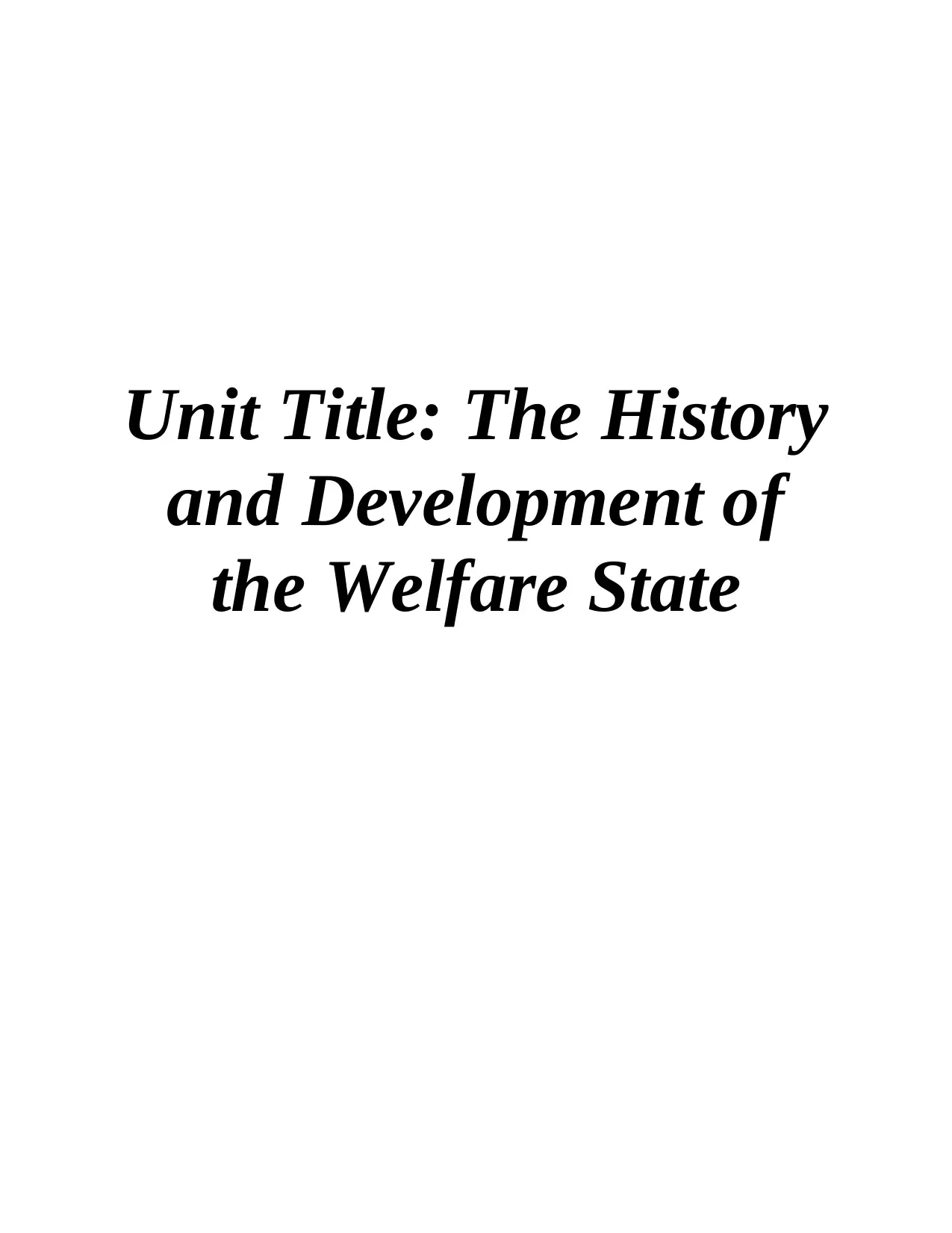
Unit Title: The History
and Development of
the Welfare State
and Development of
the Welfare State
Paraphrase This Document
Need a fresh take? Get an instant paraphrase of this document with our AI Paraphraser
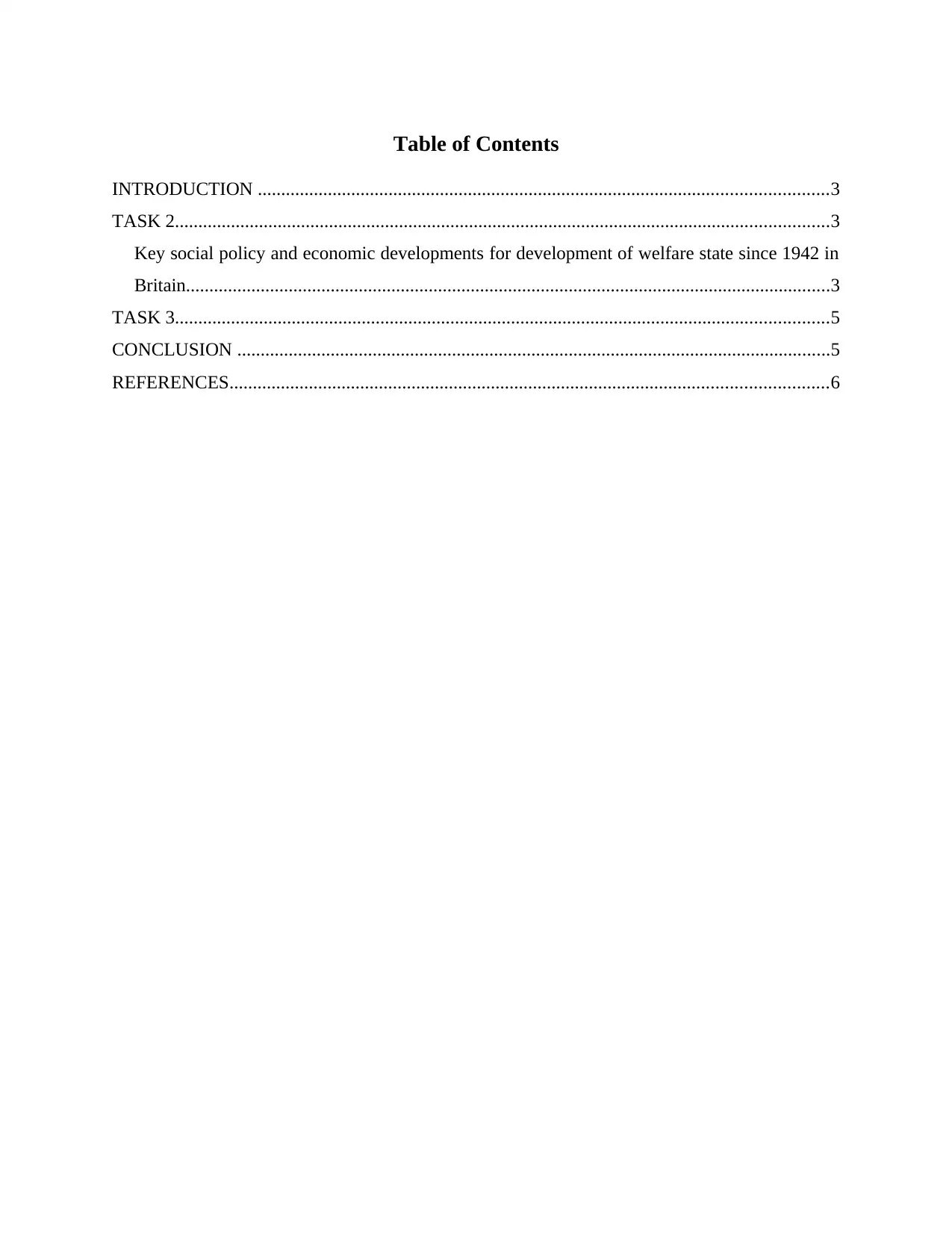
Table of Contents
INTRODUCTION ..........................................................................................................................3
TASK 2............................................................................................................................................3
Key social policy and economic developments for development of welfare state since 1942 in
Britain..........................................................................................................................................3
TASK 3............................................................................................................................................5
CONCLUSION ...............................................................................................................................5
REFERENCES................................................................................................................................6
INTRODUCTION ..........................................................................................................................3
TASK 2............................................................................................................................................3
Key social policy and economic developments for development of welfare state since 1942 in
Britain..........................................................................................................................................3
TASK 3............................................................................................................................................5
CONCLUSION ...............................................................................................................................5
REFERENCES................................................................................................................................6
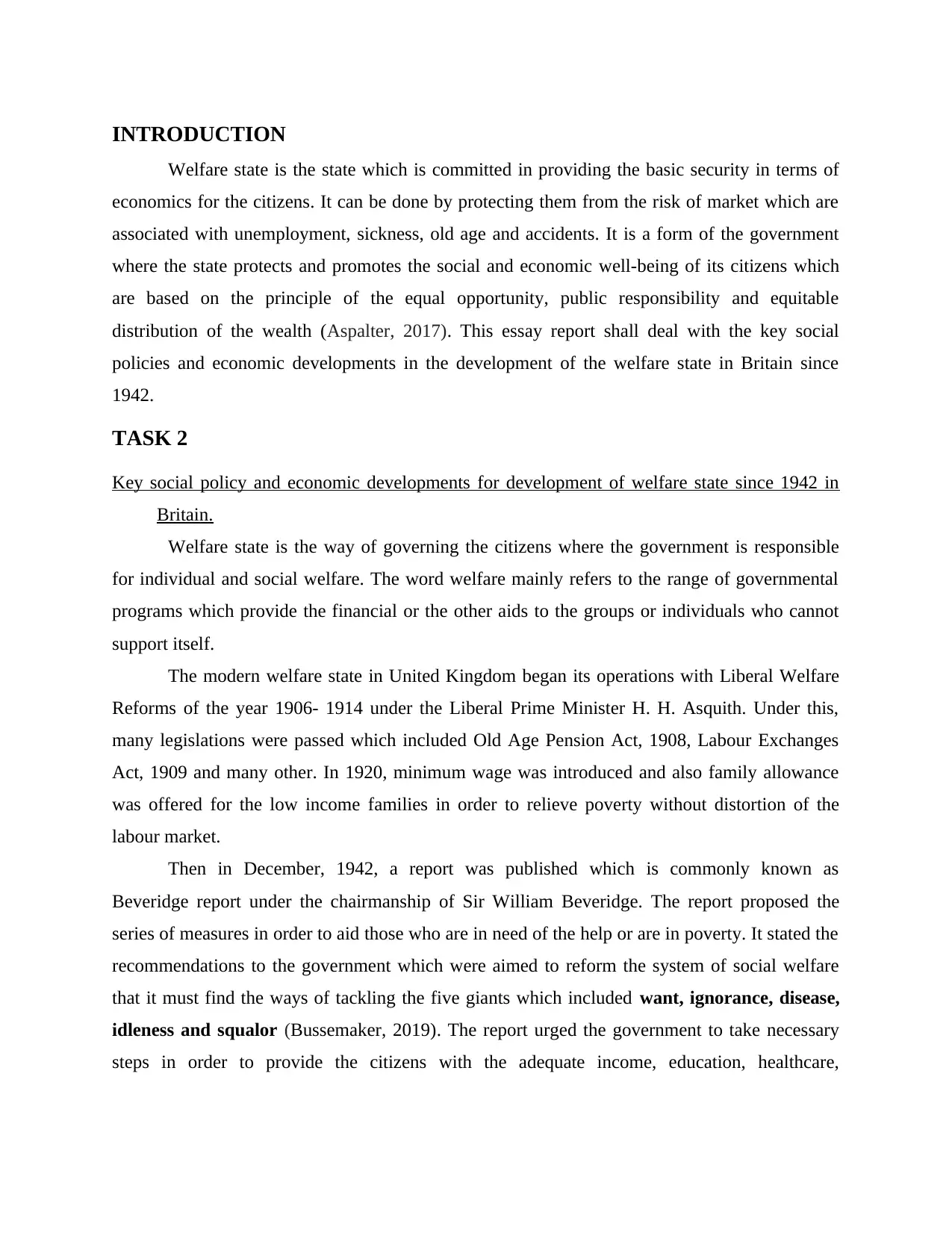
INTRODUCTION
Welfare state is the state which is committed in providing the basic security in terms of
economics for the citizens. It can be done by protecting them from the risk of market which are
associated with unemployment, sickness, old age and accidents. It is a form of the government
where the state protects and promotes the social and economic well-being of its citizens which
are based on the principle of the equal opportunity, public responsibility and equitable
distribution of the wealth (Aspalter, 2017). This essay report shall deal with the key social
policies and economic developments in the development of the welfare state in Britain since
1942.
TASK 2
Key social policy and economic developments for development of welfare state since 1942 in
Britain.
Welfare state is the way of governing the citizens where the government is responsible
for individual and social welfare. The word welfare mainly refers to the range of governmental
programs which provide the financial or the other aids to the groups or individuals who cannot
support itself.
The modern welfare state in United Kingdom began its operations with Liberal Welfare
Reforms of the year 1906- 1914 under the Liberal Prime Minister H. H. Asquith. Under this,
many legislations were passed which included Old Age Pension Act, 1908, Labour Exchanges
Act, 1909 and many other. In 1920, minimum wage was introduced and also family allowance
was offered for the low income families in order to relieve poverty without distortion of the
labour market.
Then in December, 1942, a report was published which is commonly known as
Beveridge report under the chairmanship of Sir William Beveridge. The report proposed the
series of measures in order to aid those who are in need of the help or are in poverty. It stated the
recommendations to the government which were aimed to reform the system of social welfare
that it must find the ways of tackling the five giants which included want, ignorance, disease,
idleness and squalor (Bussemaker, 2019). The report urged the government to take necessary
steps in order to provide the citizens with the adequate income, education, healthcare,
Welfare state is the state which is committed in providing the basic security in terms of
economics for the citizens. It can be done by protecting them from the risk of market which are
associated with unemployment, sickness, old age and accidents. It is a form of the government
where the state protects and promotes the social and economic well-being of its citizens which
are based on the principle of the equal opportunity, public responsibility and equitable
distribution of the wealth (Aspalter, 2017). This essay report shall deal with the key social
policies and economic developments in the development of the welfare state in Britain since
1942.
TASK 2
Key social policy and economic developments for development of welfare state since 1942 in
Britain.
Welfare state is the way of governing the citizens where the government is responsible
for individual and social welfare. The word welfare mainly refers to the range of governmental
programs which provide the financial or the other aids to the groups or individuals who cannot
support itself.
The modern welfare state in United Kingdom began its operations with Liberal Welfare
Reforms of the year 1906- 1914 under the Liberal Prime Minister H. H. Asquith. Under this,
many legislations were passed which included Old Age Pension Act, 1908, Labour Exchanges
Act, 1909 and many other. In 1920, minimum wage was introduced and also family allowance
was offered for the low income families in order to relieve poverty without distortion of the
labour market.
Then in December, 1942, a report was published which is commonly known as
Beveridge report under the chairmanship of Sir William Beveridge. The report proposed the
series of measures in order to aid those who are in need of the help or are in poverty. It stated the
recommendations to the government which were aimed to reform the system of social welfare
that it must find the ways of tackling the five giants which included want, ignorance, disease,
idleness and squalor (Bussemaker, 2019). The report urged the government to take necessary
steps in order to provide the citizens with the adequate income, education, healthcare,
⊘ This is a preview!⊘
Do you want full access?
Subscribe today to unlock all pages.

Trusted by 1+ million students worldwide
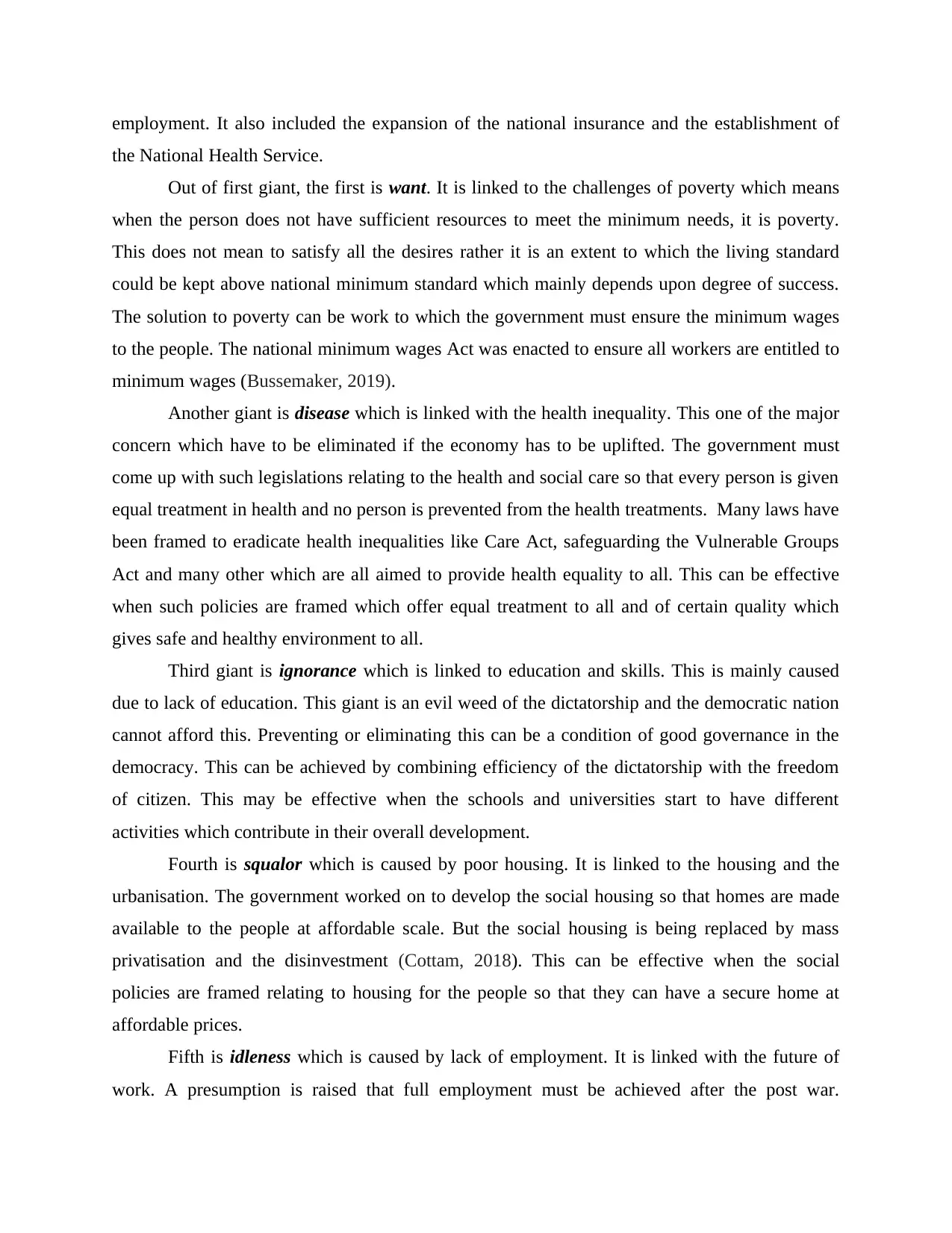
employment. It also included the expansion of the national insurance and the establishment of
the National Health Service.
Out of first giant, the first is want. It is linked to the challenges of poverty which means
when the person does not have sufficient resources to meet the minimum needs, it is poverty.
This does not mean to satisfy all the desires rather it is an extent to which the living standard
could be kept above national minimum standard which mainly depends upon degree of success.
The solution to poverty can be work to which the government must ensure the minimum wages
to the people. The national minimum wages Act was enacted to ensure all workers are entitled to
minimum wages (Bussemaker, 2019).
Another giant is disease which is linked with the health inequality. This one of the major
concern which have to be eliminated if the economy has to be uplifted. The government must
come up with such legislations relating to the health and social care so that every person is given
equal treatment in health and no person is prevented from the health treatments. Many laws have
been framed to eradicate health inequalities like Care Act, safeguarding the Vulnerable Groups
Act and many other which are all aimed to provide health equality to all. This can be effective
when such policies are framed which offer equal treatment to all and of certain quality which
gives safe and healthy environment to all.
Third giant is ignorance which is linked to education and skills. This is mainly caused
due to lack of education. This giant is an evil weed of the dictatorship and the democratic nation
cannot afford this. Preventing or eliminating this can be a condition of good governance in the
democracy. This can be achieved by combining efficiency of the dictatorship with the freedom
of citizen. This may be effective when the schools and universities start to have different
activities which contribute in their overall development.
Fourth is squalor which is caused by poor housing. It is linked to the housing and the
urbanisation. The government worked on to develop the social housing so that homes are made
available to the people at affordable scale. But the social housing is being replaced by mass
privatisation and the disinvestment (Cottam, 2018). This can be effective when the social
policies are framed relating to housing for the people so that they can have a secure home at
affordable prices.
Fifth is idleness which is caused by lack of employment. It is linked with the future of
work. A presumption is raised that full employment must be achieved after the post war.
the National Health Service.
Out of first giant, the first is want. It is linked to the challenges of poverty which means
when the person does not have sufficient resources to meet the minimum needs, it is poverty.
This does not mean to satisfy all the desires rather it is an extent to which the living standard
could be kept above national minimum standard which mainly depends upon degree of success.
The solution to poverty can be work to which the government must ensure the minimum wages
to the people. The national minimum wages Act was enacted to ensure all workers are entitled to
minimum wages (Bussemaker, 2019).
Another giant is disease which is linked with the health inequality. This one of the major
concern which have to be eliminated if the economy has to be uplifted. The government must
come up with such legislations relating to the health and social care so that every person is given
equal treatment in health and no person is prevented from the health treatments. Many laws have
been framed to eradicate health inequalities like Care Act, safeguarding the Vulnerable Groups
Act and many other which are all aimed to provide health equality to all. This can be effective
when such policies are framed which offer equal treatment to all and of certain quality which
gives safe and healthy environment to all.
Third giant is ignorance which is linked to education and skills. This is mainly caused
due to lack of education. This giant is an evil weed of the dictatorship and the democratic nation
cannot afford this. Preventing or eliminating this can be a condition of good governance in the
democracy. This can be achieved by combining efficiency of the dictatorship with the freedom
of citizen. This may be effective when the schools and universities start to have different
activities which contribute in their overall development.
Fourth is squalor which is caused by poor housing. It is linked to the housing and the
urbanisation. The government worked on to develop the social housing so that homes are made
available to the people at affordable scale. But the social housing is being replaced by mass
privatisation and the disinvestment (Cottam, 2018). This can be effective when the social
policies are framed relating to housing for the people so that they can have a secure home at
affordable prices.
Fifth is idleness which is caused by lack of employment. It is linked with the future of
work. A presumption is raised that full employment must be achieved after the post war.
Paraphrase This Document
Need a fresh take? Get an instant paraphrase of this document with our AI Paraphraser
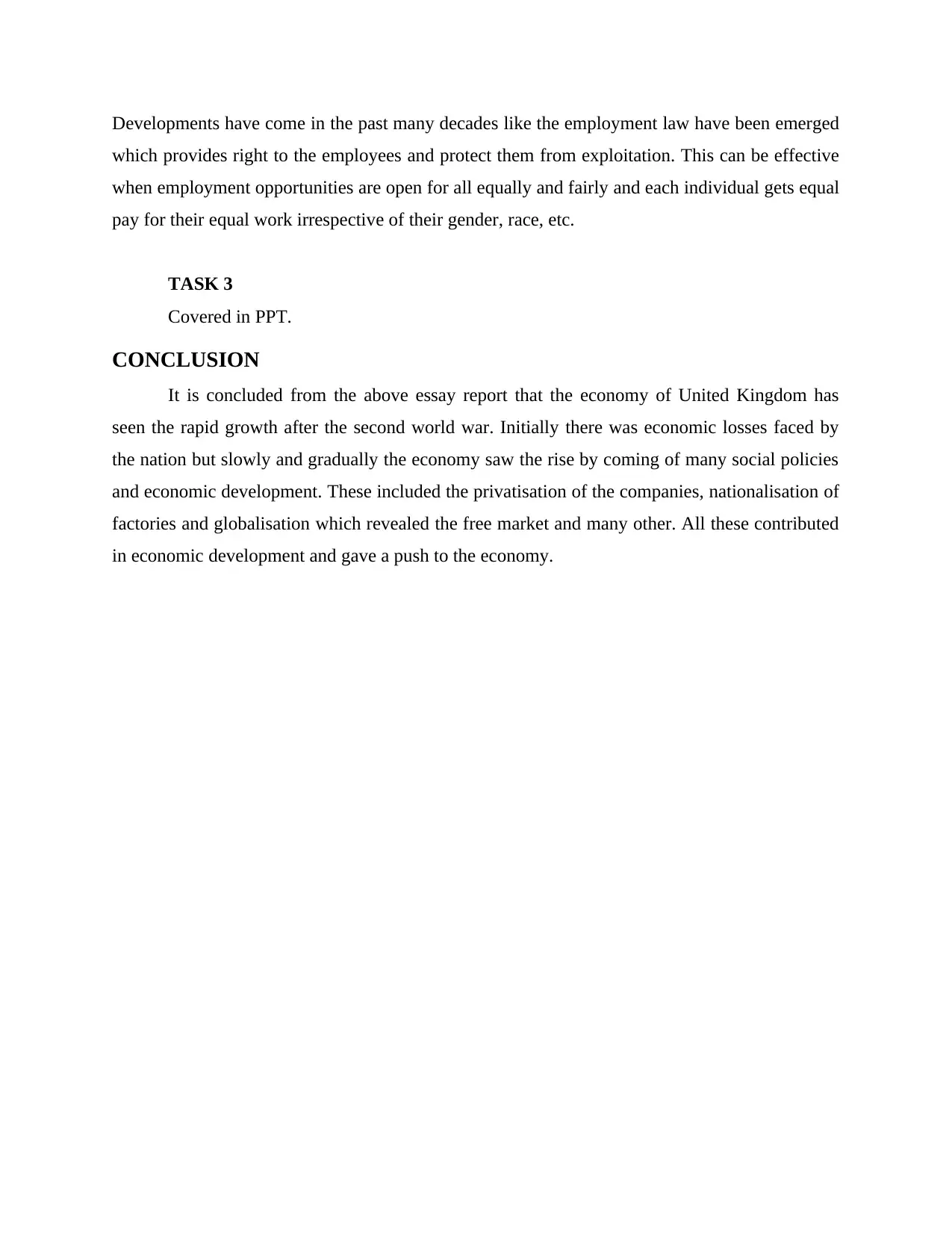
Developments have come in the past many decades like the employment law have been emerged
which provides right to the employees and protect them from exploitation. This can be effective
when employment opportunities are open for all equally and fairly and each individual gets equal
pay for their equal work irrespective of their gender, race, etc.
TASK 3
Covered in PPT.
CONCLUSION
It is concluded from the above essay report that the economy of United Kingdom has
seen the rapid growth after the second world war. Initially there was economic losses faced by
the nation but slowly and gradually the economy saw the rise by coming of many social policies
and economic development. These included the privatisation of the companies, nationalisation of
factories and globalisation which revealed the free market and many other. All these contributed
in economic development and gave a push to the economy.
which provides right to the employees and protect them from exploitation. This can be effective
when employment opportunities are open for all equally and fairly and each individual gets equal
pay for their equal work irrespective of their gender, race, etc.
TASK 3
Covered in PPT.
CONCLUSION
It is concluded from the above essay report that the economy of United Kingdom has
seen the rapid growth after the second world war. Initially there was economic losses faced by
the nation but slowly and gradually the economy saw the rise by coming of many social policies
and economic development. These included the privatisation of the companies, nationalisation of
factories and globalisation which revealed the free market and many other. All these contributed
in economic development and gave a push to the economy.
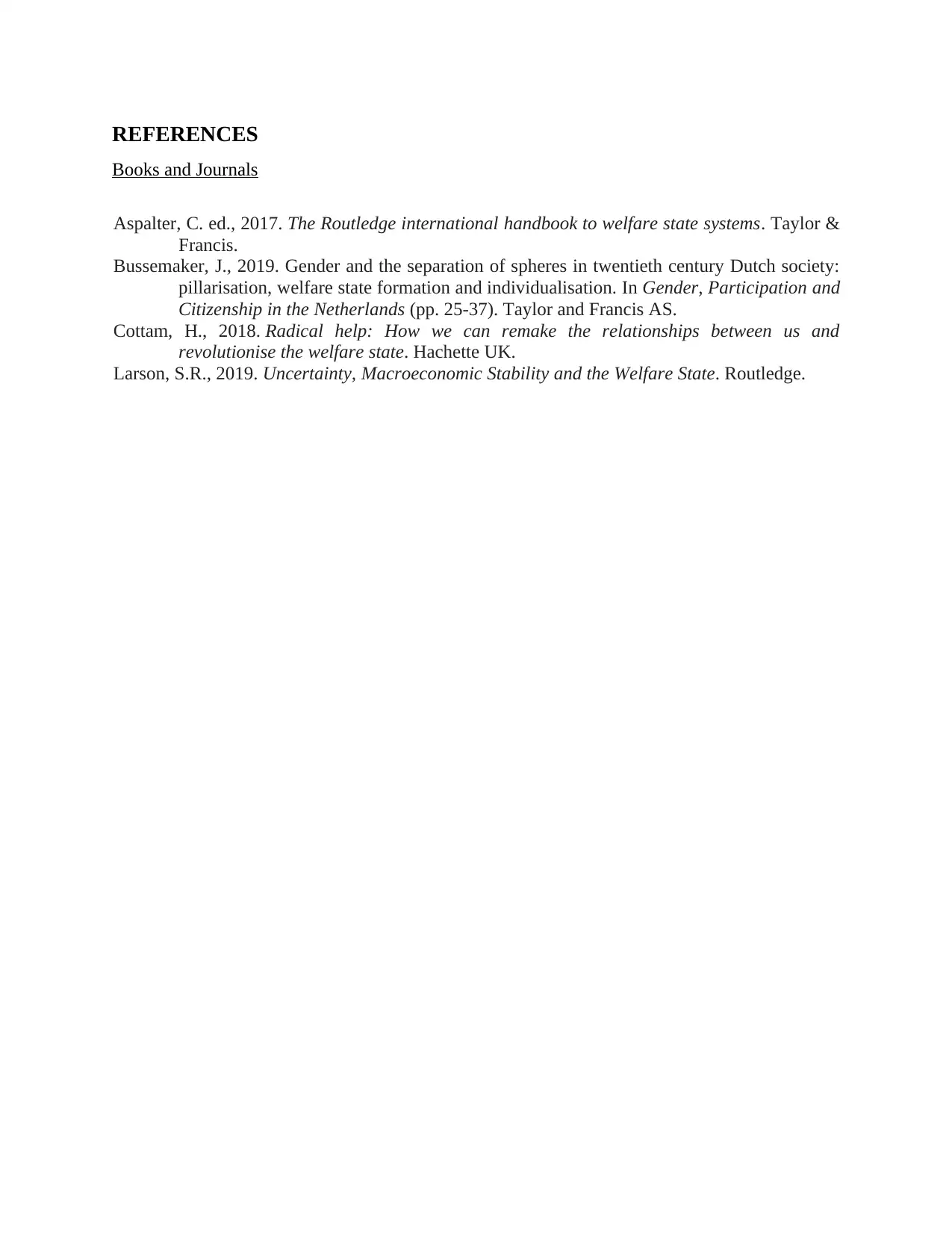
REFERENCES
Books and Journals
Aspalter, C. ed., 2017. The Routledge international handbook to welfare state systems. Taylor &
Francis.
Bussemaker, J., 2019. Gender and the separation of spheres in twentieth century Dutch society:
pillarisation, welfare state formation and individualisation. In Gender, Participation and
Citizenship in the Netherlands (pp. 25-37). Taylor and Francis AS.
Cottam, H., 2018. Radical help: How we can remake the relationships between us and
revolutionise the welfare state. Hachette UK.
Larson, S.R., 2019. Uncertainty, Macroeconomic Stability and the Welfare State. Routledge.
Books and Journals
Aspalter, C. ed., 2017. The Routledge international handbook to welfare state systems. Taylor &
Francis.
Bussemaker, J., 2019. Gender and the separation of spheres in twentieth century Dutch society:
pillarisation, welfare state formation and individualisation. In Gender, Participation and
Citizenship in the Netherlands (pp. 25-37). Taylor and Francis AS.
Cottam, H., 2018. Radical help: How we can remake the relationships between us and
revolutionise the welfare state. Hachette UK.
Larson, S.R., 2019. Uncertainty, Macroeconomic Stability and the Welfare State. Routledge.
⊘ This is a preview!⊘
Do you want full access?
Subscribe today to unlock all pages.

Trusted by 1+ million students worldwide
1 out of 6
Related Documents
Your All-in-One AI-Powered Toolkit for Academic Success.
+13062052269
info@desklib.com
Available 24*7 on WhatsApp / Email
![[object Object]](/_next/static/media/star-bottom.7253800d.svg)
Unlock your academic potential
Copyright © 2020–2026 A2Z Services. All Rights Reserved. Developed and managed by ZUCOL.





